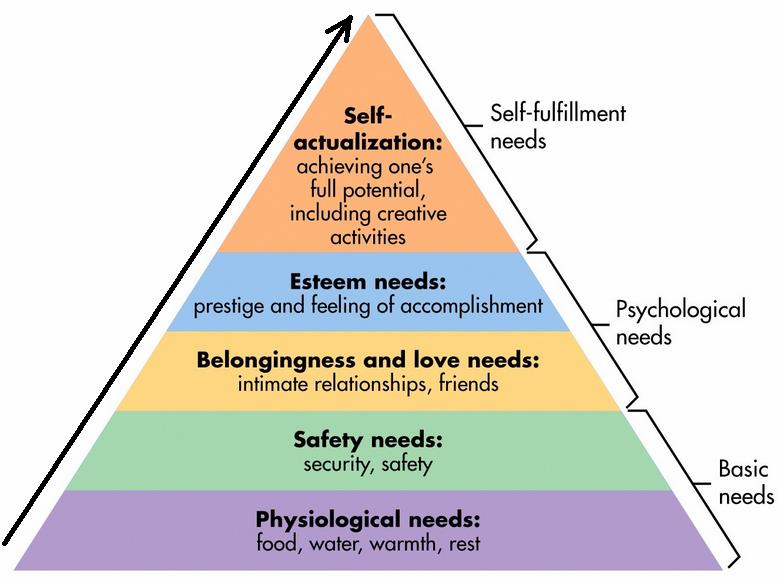Abraham Maslow, the renowned American psychologist is probably best known for creating Maslow’s hierarchy of needs. His theory of psychological health based on innate human needs.
When we look at his theory we see the most important is Physiological as the foundation of human needs; categorized as food, water, air, sleep, homeostasis and excretion.
The next need is Safety; security of body, health, morality, resources, the family and property. Following on we have Love and belonging; friendship, family and sexual intimacy. Fourth on his list is Esteem; Here he lists self-esteem, confidence, achievement, respect of others and respect by others. Finally we have Self-actualization; Morality, creativity, spontaneity, problem solving, lack of prejudice and acceptance of facts.
The first two levels of the pyramid are considered basic needs, the 3rd and 4th psychological needs, while the top level of the pyramid is considered self fulfilment/growth needs. The first four level needs must be satisfied before self-actualization can influence behaviour.
For this blog I want to focus on Maslow’s fourth theory; Esteem, and principally the need to be noticed.
Why do we all feel the need to be recognized, to feel special? How we perceive others and how they see us and treat us is of great importance. Being successful can be very gratifying. But the measure of one’s success varies for every one of the 7.5 billion people on earth. For some, it could winning an Oscar, to another it could be growing vegetables to feed your family, success means different things to different people.
So why are some of us obsessed with a celebrity lifestyle, while others will be fulfilled to live simply and anonymously?
I have witnessed fear of success (subconsciously) terminating talent. Talent can bring success and success can bring responsibilities, many have balked, never fulfilling their potential. Living simply and living in fear are completely different levels of consciousness.
“A leader is best
When people barely know he exists
Of a good leader, who talks little,
When his work is done, his aim fulfilled,
They will say, “We did this ourselves.”
― Lao-Tzu, Tao Te Ching
Many of our clients have commented on why I don’t market myself more openly! I always listen; however, I feel it is important that my brand and company marketing process should encapsulate and promote the holistic aspects and philosophies the academy was founded on. Finding a balance between altruistic services and attention to detail begets synergy to success.
Personally I’ve never felt the urge to take a picture of my meal or snap shot my every move and post it to social media! This is commonplace now; what psychological needs underpin the need to send out to the world our latest feast or movements?! Are these public posts sent in the hope of a boost to ones self- esteem? Ask yourself how you feel when people ‘like’ your post, now ask yourself how you feel when people ignore or don’t hit that ‘like’ button. Are you looking to others for approval? If so, is there not a more salutary solution for veritable approval? This is something for us all to think about. Before social media, how did our Grand-Parents generation boost their esteem needs?
Dr. Maslow was once asked…”what does it take to become self-actualized”? He replied; there are three things you must know and understand. Firstly, you have to become independent of the good opinion of other people. Secondly, self actualizers are people who have no attachment to the outcome; they are detached from the fruits of their labour. And finally, they have no investment in power over other people.
In my experience, self-actualizers have an (almost) palpable aura of (bona fide) self-esteem. They have no need to dominate, control, compete or subjugate others. Those who have entered into this realm of consciousness never feel the urge to broadcast their knowing. They are always willing to impart this awareness by living true to their divine source (love) and will always answer their calling. By doing so, their self-esteem perpetually vivifies.
There are many factors that contribute to achieving good self-esteem. This begins at infancy and life lessons from childhood; mistakes, accomplishments, decisions, freedom, boundaries, encouragement, security, health, bonding and respect all living things. We know that the quantum mind develops between the times of conception and that what we experience from then until seven years of age will be imprinted and absorbed within the baby and child. It is during this stage of life that habits, behaviours and idiosyncrasies are formed. If the parents or guardians are self-actualizers, they will have lived a balanced life with good self-esteem. This reminds me of a conversation I had with my Dad many years ago. I recall mentioning to him…..”you never told me what to do, I just watched and repeated”
Of course there are many people who have had a troubled upbringing, and yet shape their lives into a sojourn of beauty on this planet. So how can we achieve an improved sense of wellbeing and self-esteem without striving for the attention and/or approval from others? The modular design of our system involves exercises and studies to assist students to improve self-esteem.
Don’t compare;
This is a difficult one, particularly in the dojo (martial arts training area). Students will often hear me say that I want to be on the mats until the day I check out! I know the only way this will be accomplished is by not comparing myself to anyone, thus dissipating the ego and its need to be noticed. Training must be balanced – hard and fast, slow & soft. Something I continuously work on. The grind sharpens the blade.
Talk to yourself; as you think, so shall you be. The way you think about yourself has a huge bearing on your self-esteem. Focus your thoughts on all the love you have inside you. You may have love for nature, art, cooking, dogs; it doesn’t matter. Love is the foundation and creation of all beauty and it can be channeled whenever and wherever you choose.
It’s OK to make mistakes;
If you have experienced negativity from others when you’ve made mistakes you may have felt like a failure. We all make mistakes; it’s all part of our growth. When others criticise or feel the need to (negatively) point out your mistakes, do not react or judge them. They cannot give what they do not have. They are simply pointing out your mistakes to distance themselves from their own mistakes! When you become self-actualized you will be happy to guide and serve others without the need to chastise.
Aidan Carroll

